The Untold Truth Of The Freedom Riders
When protests erupted in response to footage of a Minneapolis police officer killing George Floyd — a helplessly handcuffed man who cried out for his mother as a uniformed government official kneeled on his neck for nearly nine minutes — a few familiar scenes played out in the media. Among them was the pattern of public figures accusing so-called outsiders of entering their cities to fan the flames of violence and discord. Yahoo News notes that Barack Obama's former national security advisor, Susan Rice, pointed the finger at "foreign actors," specifically Russians. USA Today ran a headline that said, "officials blame 'out-of-state 'agitators.'" Unsurprisingly, those officials were full of it.
You may have heard in those words the historical echoes of how detractors reacted to the 1961 Freedom Riders. The riders were a collection of black and white protesters who traveled on buses throughout the Deep South to protest state governments' refusal to enforce federal rulings that declared segregated buses unconstitutional. Per PBS and NPR, detractors attacked the rides as the work of "outside agitators" and "dirty communists." One might be tempted to call these riders freedom fighters, but they weren't the ones doing the fighting. White mobs greeted the Freedom Riders with pipes, bats, bombs, fists, kicks, and the rabid animus of a system that refused to accept equality for blacks.
The deeply agitated South
The notion that Americans traveling through America could be labeled "outside agitators" should have always been preposterous on its face. As MLK eloquently put it in his letter from a Birmingham jail, "Anyone who lives inside the United States can never be considered an outsider anywhere within its bounds." Yet the Jim Crow South was bound to see Freedom Rides as interference from interlopers. Nearly a century earlier, the 1876 presidential election had been fraught with widespread fraud and violence, leading to the 1877 Compromise, in which southern governments dishonestly promised to preserve the civil rights of blacks in exchange for the federal government staying out of the South's affairs, via History.
The resulting system of segregation and disempowerment of blacks was partly premised on "the end of federal interference in southern affairs." So even though bus-bound Freedom Riders had federal law on their side, the South was armed with a longstanding tradition of insular thinking and violent racism. In a dark twist on the southern mentality of government noninterference, police often refused to intervene when mobs descended on the detested "outsiders" riding into their towns.
Addressing a terminal cancer in transportation
As History describes, when Freedom Riders in Birmingham, Alabama were attacked by a pipe-wielding mob, the ironically titled Commissioner of Public Safety, "Bull" Connor, refused to protect the protesters, citing the fact that it was Mother's day. When riders were arrested in Mississippi for protesting, a judge stared at the wall while they made their case. Meanwhile scenes flaming buses and bloodied Freedom Riders shocked the world.
It turned out the very same USA that JFK proclaimed would "pay any price, bear any burden, meet any hardship, support any friend, oppose any foe to assure the survival and the success of liberty" in his inaugural address needed to address its own abject lack of liberty. His brother, Attorney General, Robert Kennedy deployed the National Guard to Alabama to try protect the civil rights protesters from the violent mobs they encountered. As months of turmoil dragged on, JFK quit dragging his feet and ordered the Interstate Commerce Commission to address the unlawful segregation of interstate bus terminals.


